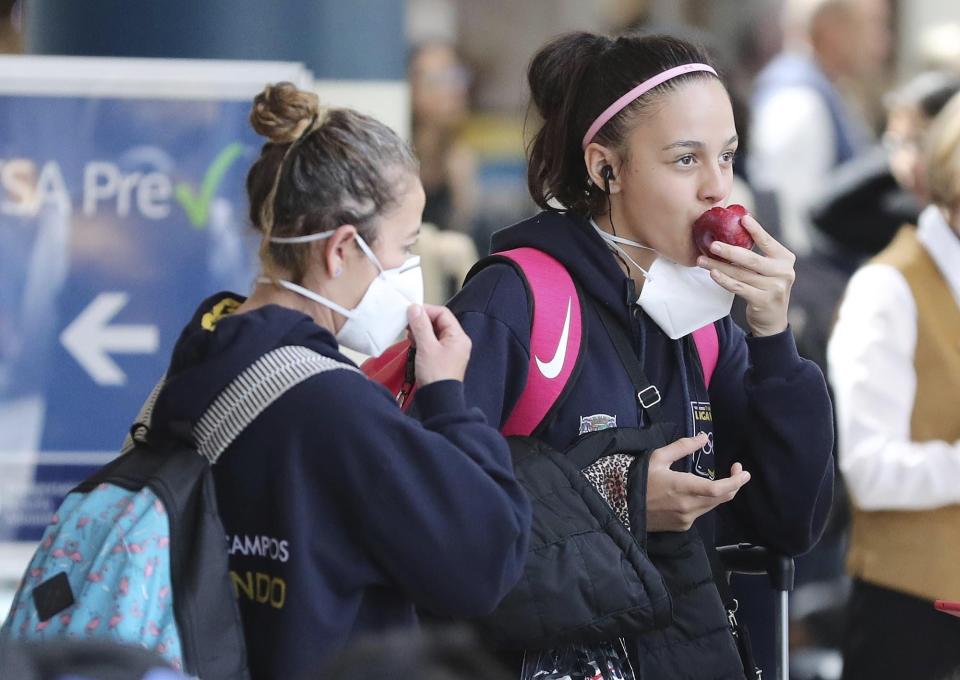Politics on a plane! Giving anti-maskers section on airliner validates bad behavior | Frank Cerabino
Gerald Skoning of Juno Beach wrote a guest column for The Palm Beach Post suggesting that commercial airlines should consider a possible flying future that includes seating sections based on mask status.
Segregating passengers by their willingness to obey governmental directives and guidance would be a bold experiment. And implementing it harkens back to the days when airlines created smoking sections in the cabin for those passengers who wanted to light up during a flight.

Here's what free speech is, and what it isn't: Disruptive PBIA airline passengers get lesson in the limits of 'free speech' | Frank Cerabino
Who wants a government job? Handling the applications for Gov. DeSantis' elections police force | Frank Cerabino
Crime and punctuation: Words of caution about sentencing people to write sentences | Frank Cerabino
“The division of airliner cabins into smoking and nonsmoking sections should be a model for protecting the health of the flying public as the pandemic continues,” Skoning wrote.
“Allowing masked passengers to sit in a section of the aircraft away from fellow travelers who are mask-free would protect those passengers’ health and safety (by up to 99.6% according to the recent study), while at the same time accommodating anti-maskers’ perceived 'rights' to go mask-less on airliners.”
Anti-maskers on airlines a symptom of social divide
While it’s an interesting idea, it misses the real issue here: that it’s increasingly harder to take a random grouping of a couple hundred Americans, lock them up in a confined space for a couple of hours and expect that everybody will just get along with each other.
Sad, but true. We're not just getting sick. We're getting sick of each other.
We just had a reminder of that recently when a couple got booted from a JetBlue flight getting ready to take off from Palm Beach International Airport.
The couple got into an argument with the passengers around them. There was name calling. The free speech rights in the U.S. Constitution were haphazardly invoked. The soon-to-be-booted woman berated her fellow passengers, calling them sheep, and throwing in some “baaaahs” for effect.
Then she summed it up this way:
“We've got to get off the plane because we’re Trump supporters,” she said. “Serious, I really think that’s what it is.”
The smoking section the airlines implemented last century was based on the idea that if all the smokers were put in one section, there would be fewer complaints from the nonsmokers and less of a hazard to their health.
Usually, the smokers were relegated to the back rows of the cabin, which quickly became permeated with a putrid cloud of cigarette smoke that was hard to contain.
If you sat anywhere near the smoking section, you were going to inhale some smoke.
Putting anti-maskers in what would be a modern-day smoking section on planes would be equally hard to contain. While it may effectively limit the spread of COVID-19 better, it wouldn’t do anything to limit the animus in the cabin, which is already a big problem in domestic air travel.
Hard to contain political debate on plane
That’s because political views, like smoke, tend to be worse when concentrated, and also have the property of drifting.
So if you divided the cabin into maskers and anti-maskers, all the people with strong views would end up being buoyed by being in the company of like-minded people, while also incensed by the sight of all the people in their presence who hold them in low regard.
Dividing up the cabin is like passing out team uniforms. And now that you know where the other team is sitting, it just makes it easier to get things rolling with a “Lock ‘em up!” Fauci chant, or a lecture about public responsibility delivered by a person in a face shield and standing in the aisle.
Dividing up like-minded Americans into the segregated sections doesn’t hermetically seal them off. It just makes them more sure of themselves.
So let’s say that JetBlue passenger was accommodated by a “Trump voter” section of the plane, where she and her husband would be able to fly without feeling the need to lecture her nearby passengers about “freedom.”
All that would do is to put a Trump rally in part of the plane, with the remainder of the cabin repulsed by the “Let’s Go Brandon!” chanting.
Look what happened to cigarette smoking on planes.
In February of 1990 it was banned for good on all domestic flights after the airlines faced years of lobbying efforts from flight attendants and a scientific study that found that their exposure to secondhand smoke on the planes was the equivalent of smoking a pack of cigarettes per day.
At first, the Air Transport Association, the trade group for the airlines, maintained that there was no way to keep passengers from smoking during flights. The ATA took the position, “smoking is a fact of life; it is something we must accommodate.”
And the pilot’s union was equally slow to push for the smoking ban, reasoning that if smoking was banned on flights, passengers would just use the onboard lavatories as smoking lounges.
Those arguments seem foolish now, some four decades later.
I think it may seem equally foolish in the future to accommodate people who ignore today’s public-health directives.
fcerabino@gannett.com
@FranklyFlorida
This article originally appeared on Palm Beach Post: Anti-maskers, like cigarette smokers, ought not be coddled by airlines

